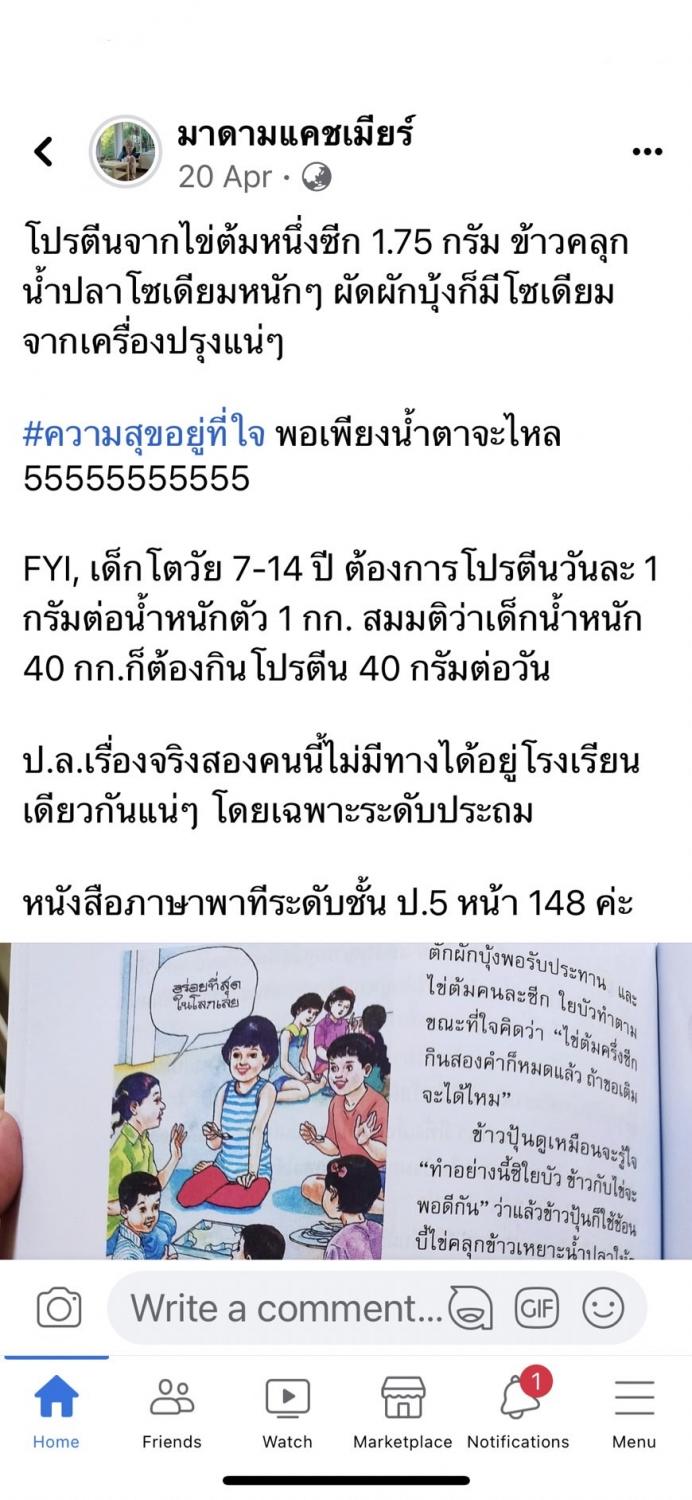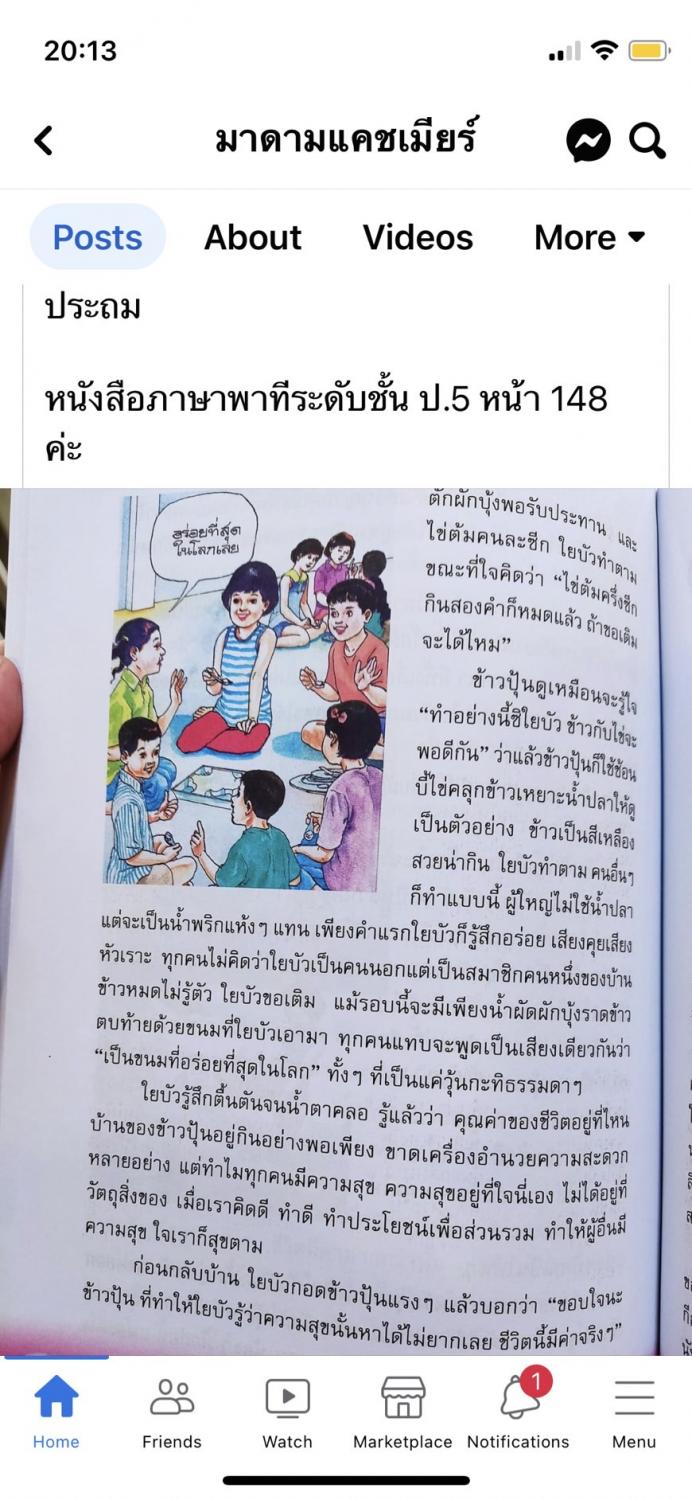In the past few weeks, there has been criticism of the Thai language textbook Pasa Patee for 5th graders. In the ninth chapter titled "Value Of Life", a rich girl named Yaibua tells her best friend Khaopoon, who is an orphan, that she wanted to die because her parents did not buy her a new mobile phone. Khaopoon took Yaibua to her orphanage where she experienced a meal of some rice, half a boiled egg and fish sauce. Everyone was happy and enjoyed the meal. This made Yaibua realise that happiness comes from a person's state of mind, not material possessions.
The Facebook page Madam Cashmere posted a page from chapter nine and pointed out that Khaopoon and the other orphans do not receive adequate nutrition needed by young people aged seven to 14. Many comments on the post also criticised the textbook for romanticising poverty.
Amporn Pinasa, the secretary-general of the Office of the Basic Education Commission (Obec), explained that the fictional story was created to help students understand that happiness is a state of mind, and not dependent on material possessions. Therefore, nutrition, which is already included in the subject of health education, is not the main focus of the story.
This is not the first time that Pasa Patee has been criticised. In 2020, chapter 14 was criticised because it aimed to teach female students to value their virginity. The story portrays a male-dominant attitude because female readers are taught to be sexually reserved while male readers can have sexual relationships without being judged.
In the talk forum "Myth In Thai Textbook: Crisis Or Opportunity?", Asst Prof Sukanya Sompiboon, vice-dean of the Faculty of Communication Arts at Chulalongkorn University, said that Pasa Patee suggests students analyse and make decisions based on logical reasoning. Therefore, a dramatic event involving Pasa Patee is good because it prompted society to analyse the contents of the textbook.
"Most parents consider textbooks published by Obec to be perfect. I wonder whether students dare go against the textbook if it may affect their exam scores. One of the exercise questions at the end of chapter 14 is, what is the name of the female character who engaged in underage sex? The question does not require any analysis, but requires memorising the content," said Asst Prof Sukanya.
"An executive of Obec said in an interview that we should separate fiction from reality since the story of Yaibua is fiction which focuses on happiness, not nutrition. However, we cannot separate Yaibua's story from the issue of nutrition. This chapter should be rewritten to avoid romanticising poverty," she added.
Assoc Prof Sittichai Wichaidit, director of the Online Master's Programmes at the Faculty of Learning Sciences and Education, Thammasat University, commented that the story of Yaibua became a popular topic because the Facebook post criticised the textbook by pointing out scientific or nutritional issues, and not language issues.
"We always encourage students to raise arguments based on science. When Madam Cashmere explained the case using scientific or nutritional facts, readers could see that something in Yaibua's story does not make sense. This helped readers realise that textbooks can be interdisciplinary and subjects can be interwoven. It depends on which perspective we take," said Assoc Prof Sittichai.
While many people criticised Pasa Patee, other people praised Thai language textbooks used in the past such as Mana Manee and Daroonsuksa. It was interesting to see that some adults thought that Thai language textbooks in their day were better written than Pasa Patee.
The moderator of the talk, Asst Prof Adisorn Chantarasuk, dean of the Faculty of Learning Sciences and Education, Thammasat University, raised the question, should textbooks continue their purpose of instructing students?
Assoc Prof Sittichai said that textbooks are responsible for providing knowledge to students. Although textbooks instruct students, teachers can use them as a tool to create learning experiences and encourage students to come up with further questions.
Sarawut Jomnum, associate director for Learning Process at Thammasat Secondary School, believes that textbooks should not be the only source of learning and that schools do not have to use the same textbooks. There should be diverse textbooks appropriate for students of various levels.
"Textbooks should not be designed to persuade students to believe in certain issues because, in today's digital age, students can access information and facts through various sources. For example, when talking about nutrition, there are many kinds of nutrition for different groups of people such as working professionals, athletes and patients. Students can access this information, so they are not limited to believing in only the content provided in school textbooks," he said.

Pasa Patee on Madam Cashmere's Facebook. Photo: facebook.com/maebankashmir
The forum also discussed how to encourage young people to read more books. All speakers agreed that young people read a lot, but the genre of books they read are not textbooks. In 2021, the Publishers and Booksellers Association of Thailand reported that the best-selling books at the book fair were cartoons and light novels.
Assoc Prof Sittichai mentioned that PISA, or the Organization for Economic Co-operation and Development's Programme for International Student Assessment, measures 15-year-olds' ability to use their reading, mathematics and science knowledge and skills to meet real-life challenges. The result of PISA tests demonstrated that young Thai people's reading skills were much lower than the global standard.
"Young Thai people's reading skills were below the global average in terms of reading comprehension and summarisation. The skill with the lowest score was evaluating the credibility of articles. The results showed that young Thai readers did not have a wide range of reading genres and had limited analysing and summarising skills. Perhaps Thailand does not promote these skills very much. The Yaibua issue may trigger teachers to use textbooks to enhance these skills," said Assoc Prof Sittichai.
To solve problems that occur, speakers agreed that both textbooks and teachers must be improved. To improve textbooks, there should be a collaboration between experts in different fields. Assoc Prof Sittichai said people should not expect textbooks to be perfect.
"There are no perfect textbooks. Textbooks are only books which present certain viewpoints. We should focus on learning outcomes rather than textbooks. Teachers can use textbooks as tools to help students reach learning outcomes. However, will teachers have time to design learning experiences for students since they have a lot of other responsibilities? Thus, we have to consider the structure of the administration in state agencies and the working structure of schools."
As a participant and the president of the Creative for Reading Culture Promotion Foundation, Sudjai Promkerd said that teachers have to change their mindset regarding reading to children.
"Encouraging children to enjoy reading must start before the age of six. The power of reading will help children have better concentration and analysis skills. However, we discovered that when teachers read to primary students, they explain every chapter in detail. Students cannot use their imagination and creativity. These teachers should change their mindset and understand more about the learning process."
Asst Prof Sukanya and Su Boonlieng, participant and author, agreed that before launching textbooks, they should be reviewed by different groups apart from the textbook committees.
"The writing process requires experts, but after the books are finished, we would like to look at them. People in the community such as students, scholars and individuals from different professions should be part of the review process. We can appreciate or criticise constructively," said Su.


